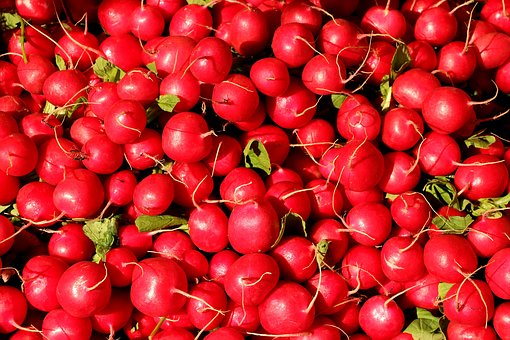Radishes: Rich in Vitamin C and Great for Digestive Health
© HealthyMuslim. See Terms and Conditions

Radishes are from the Cruciferae family, like cabbage, broccoli, and Brussels sprouts. Like these vegetables, radishes also contain glucosilinates and other sulfurous compounds that give these brassica vegetables their flavor and offer valuable protection against cancer. A study in Italy found the Japanese daikon variety of radish to demonstrate anti-cancer activity toward three human colon carcinoma cell lines.
Radishes are also useful for gall-bladder and liver problems. Radish juice has a powerful effect on the gall-bladder, making it contract and pump more bile into the stomach. It's this increase in bile that improves the digestion of fats, and why radishes are useful when eaten before a meal.
Radishes are rich source of other nutrients too; they contain potassium, calcium, sulfur, Vitamin C, folic acid and selenium.
Radishes have a peppery flavor and a crisp, crunchy texture. There are many varieties of radish, including the popular small variety of radish which has a red skin and white flesh. Another variety is the large white mooli or diakon radish, which is shaped like a carrot, and has a milder flavor than the smaller, red varieties.
Tips for Using Radishes
- Eat radishes as fresh as possible, when they are still young and crisp.
- Fresh, raw radishes contain more Vitamin C and other nutrients than cooked radishes.
- The green leaves on the top of radishes are also delicious and equally nutritious. In fact, radish leaves contain almost six times the Vitamin C content of their roots and are also a good source of calcium.
- Radishes are very easy to grow yourself from seed. They can be grown indoors in a window box or outside in the garden, and are fast-growing, taking 3-4 weeks to mature.
Link to this article: Show: HTML Link • Full Link • Short Link
Share or Bookmark this page: You will need to have an account with the selected service in order to post links or bookmark this page.





|
Related Articles:
- Vitamin C Protects Against Gout
- Nutrients and Superfoods for Healthy Skin
- Grapefruit Can Promote Healthy Gums
- Goji Berries: A Great Superfood
- Book: Curing the Incurable: Vitamin C, Infectious Diseases, and Toxins - Thomas E Levy
- Higher Plasma Vitamin C Levels Reduce Risk Of Developing Type 2 Diabetes
- What Foods Are Good For Your Eyesight?
- Levels of Food Combination Digestibility
- Nutrition Basics: The Body's Digestive Cycle Explained
- Dr Linus Pauling, Vitamin C Infusions and Cancer
You must be registered and logged in to comment.
Most Popular
Latest Articles
Popular Subjects
Health, fitness and longevity
Based upon the principles of health
in the Qur'an and Prophetic Traditions.
HealthyMuslim.Com
There are two bounties in which
most people lose out: good health
and free time. Al-Bukhari.























